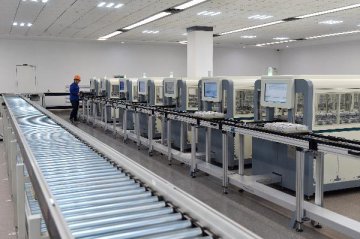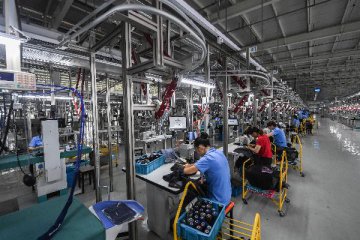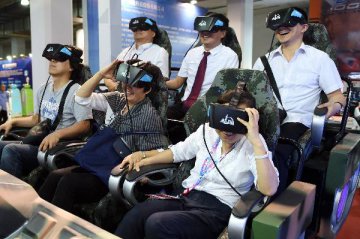
China is buttressing the Made in China 2025 strategy with new national-level demonstration areas to spur the development of smart, green and service-oriented manufacturing.
The decision is made at a State Council executive meeting presided over by Premier Li Keqiang on Wednesday.
One focus is to foster the development of emerging industries and upgrade traditional sectors by furthering the integration of manufacturing sector and the internet.
Market-oriented reform, supporting policies will be rolled out to ensure that businesses of all origins can receive the same national treatment.
"We need to select some cities or city clusters in China's eastern, western and central regions for the demonstration areas. The key is to support their piloting in system and policy innovation, and to develop an innovative atmosphere and industrial clusters for smart manufacturing," Li said.
"We must enable the manufacturing sector to become smarter, greener and more service oriented, boost the transition from traditional to new growth engines and the economy climbing upwards the value chain," he said.
Made in China 2025 was first unveiled by the premier in his Government Work Report in 2015. Two years on, the country has seen increasingly stronger industrial capabilities, smart manufacturing, innovation, product quality and branding.
Average productivity was up by 38 percent for China's first 109 pilot projects in smart manufacturing, while operating costs dropped by 21 percent, according to the Ministry of Industry and Information Technology.
The meeting on Wednesday decided that the government will take advantage of a variety of government and industry funds to spur innovation and entrepreneurship, and guide more social capital to support advanced manufacturing. In the demonstration areas, the government will offer stock incentives in State-owned enterprises.
The government will also further cut red tape and streamline approval procedure, improve business environment, and make bigger efforts in attracting foreign investment.
The use and protection of intellectual property rights will be strengthened and government compliance oversight will be reinforced.
"Local authorities are highly motivated after the unveiling of the Made in China 2025 strategy. Many countries are also upgrading their manufacturing sectors right now," Li said.
"The Chinese economy has shown a buoyant momentum, but the weakness lies in the manufacturing sector, which requires quickened expansion. We need to focus our efforts on strengthening the sector, which is the foundation of the real economy," he said.
Li highlighted the importance of opening-up and international cooperation and absorbing experience worldwide.
The meeting also decided to step up the development of innovation centers for manufacturing and technology and to establish a number of public service platforms for entrepreneurship and innovation.
The demonstration areas will also receive support in talent development, and encourage researchers and Chinese talents overseas to set up businesses in the demonstration areas.
Land supply in the demonstration areas will receive extra support, with pilot measures to transform old business and storage facilities, idle buildings and excessive commercial real estates into incubating centers for entrepreneurship.
"The innovation in system and mechanism should be on par with technological innovation. Main constraining factors for the manufacturing sector still are in the system and the mechanism, as the access threshold for manufacturing is still too high," Li said.
"The organizational structure of enterprises has changed profoundly. With the help of entrepreneurship and innovation platforms, enterprises of different sizes are developing in an integrated manner. We need to draw on experience learned and see the reform through," he said.
The premier said funding support to the demonstration areas should be in line with market principles. The government should explore new paths of development, encourage competition, play an enabling role in building platform and drawing talents, he added.























Latest comments